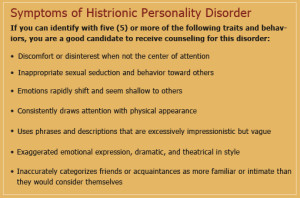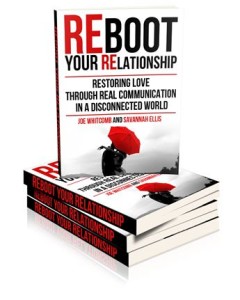Views: 2856
Ever heard of a drama queen?
These people take that moniker to the extreme. Histrionic Personality Disorder (HPD) is defined by a pervasive pattern of excessive emotionality and attention seeking, as indicated by five or more of the following:
• Uncomfortable in situations in which not the center of attention
• Inappropriately sexually seductive or provocative behavior
• Displays rapidly shifting and shallow expression of emotion
• Consistently uses physical appearance to draw attention to self
• Excessively impressionistic speech style, lacking in detail
• Self-dramatization, theatricality, and exaggerated expression of emotions
• Suggestible, easily influenced by others or circumstances
• Considers relationships to be more intimate than they actually are
Psychologists believe it to be prevalent in women. However, they also recognize that it may be under reported in men. Nobody is exactly certain what causes HPD, but experts believe it is most commonly related to early childhood events wherein the child would be rewarded for displays of self. It may also have to do with intense sibling rivalries.
Compared to other personality disorders, a very high percentage of people with HPD seek treatment. This is believed to be because treatment with a therapist is another way of getting attention.
Additionally, Studies show that patients with HPD have highly responsive noradrenergic systems, the mechanisms surrounding the release of a neurotransmitter called norepinephrine.
An estimated 2% of the population has HPD, whether clinically diagnosed or not.
TRANSCRIPT FROM L.A. RADIO SHOW – 2013
We have been talking about personality, characteristics, disorders, traits and the ways in which our personality can affect our lives and our relationships. And it’s something that I work with everyday in my practice. It’s not uncommon for many of the individuals that I see to have certain aspects of their personality that negatively-impact their relationships.
So I deal with it every day and certainly as we go through the different types of personalities, last week, we talked about Narcissistic Personality Disorder and I know that as I share them, because I can relate to certain aspects of probably several of them, but as I share some of the traits, I know a lot of people out there are saying, “Well, I can relate to that part of it.” or “I can relate to certain aspects of it.” and it’s common because we all have aspects of our personality that might fit in one or two or several categories. So we talked about Narcissistic last time, and the time before that we talked about Borderline Personality Disorder and the time before that, we talked about Obsessive-Compulsive Personality Type and today, we’re going to be talking about Histrionic Personality Disorder.
And Histrionic – the word comes from ‘hysterical” and everyone is familiar with that word hysterical. This type of personality disorder, slightly different from the others that I’ve mentioned although it’s still under the category of a dramatic disorder or condition. Remember I said in the beginning that these personality disorders are clustered into three different types. Cluster A, Cluster B, Cluster C – well, Histrionic is clustered in with some of the other dramatic ones and Narcissistic is also in the same grouping. And Histrionic – the one way of looking at it is someone who is Histrionic would be described as a ‘drama queen’. And that would be the way to describe a Histrionic Personality Type. So it’s someone who tends to be very dramatic, somewhat theatrical. Now these individuals can be extremely charming and energetic, they have a lot of emotion.
Now most people that are on TV have aspects of this Histrionic Personality Type because entertainment needs to be dramatic. When I give a talk, when I do public speaking, there needs to be a certain amount of energy and a certain amount of drama as I’m describing a situation or story because that’s entertaining. So not all aspects, and I’ve said this one before, not all aspects of every personality disorder are negative. They are not all negative. This particular one is one that, this personality disorder is one that affects relationships more than anything else. The others can be more damaging in the area of work, in the area of functioning day-to-day in life. But this one in particular impacts relationships more than anything else.
So these people are charming, they are energetic, they are highly-emotional. They can be seductive and impulsive, very out-going, very extroverted and they can also be manipulative. And this is, of all the personality disorders, this is the only personality disorder that is explicitly connected to physical appearance. So Histrionic Personality is very focused on what they look like on their physical appearance. A Histrionic person is not inclined to leave the house, now if it is a female, to leave the house unless their make-up is on, and just right, their hair is done, they are not going to walk up without make-up on, even if it is just going to public store, going to work out, they will make sure everything is done up and they look really good even if they are just running to the store. So they are very much concerned about their physical appearance.
And they also have a low-frustration tolerance and strong dependency needs. Their relationships are often insincere and stormy with a lot of drama. They require constant approval, need for approval and they require constant attention. As I was saying earlier there’s less of a negative impact with this disorder on work or social functioning but it is more on relationships, on marriage, and intimate close relationships. These individuals are highly-sensitive to criticism, they also become easily bored because again they are full of energy, and they are full of excitement, they like excitement, and they like stimulation and they like being in the center of attention but they get bored easily as well. Their self-esteem is often tied to physical appearance, so they do not do very well with aging. And they also lack the emotional depth and maturity that is part of why their relationship suffer. They have emotion and the emotion is very out there, it’s very obvious. They wear their emotions on their sleeves, so to speak but when it comes to the depth and maturity of emotion, they may lack that level of intensity. And these individuals tend to be the life of the party and they often don’t think before they act. So they maybe impulsive or they may make rash decisions.
In some cases, they may threaten suicide as a means of getting attention. But this particular personality disorder is one that I do see in my practice. And it is more common in females but the reality is that these days, there are more males that fit this category than one might expect. Still more common in females but the numbers are changing as far as this statistics go.

We are going to be talking not just about the definition of Histrionic Personality Type but we are also going to talk about what might be some causes, some risk factors and how does an individual work with this person. How does a psychologist work in therapy with this person? And what can you do if you are a family member? How do you interact with this person? So that you don’t inadvertently perpetuate some of their personality traits.
So here we are talking about the Histrionic Personality Type. And I’m also going to give you a clinical example of this. I’m going to describe a case, not a case that I have been working with but one that I found in some of the books that I have. And it will help you in understanding more about this particular personality type.
So let me start by going through the criteria for the Histrionic Personality Disorder. Again, it’s someone who has a pattern of excessive emotionality, and attention-seeking.
Usually a lot of these personality disorders started early adulthood and in the same case with this particular disorder, you’re required to have five or more of these criteria in order to actually receive the diagnosis of Histrionic Personality Disorder.
So there are eight different ones, let me read through them:
- 1. Someone who with this type of personality, they are uncomfortable in situations in which they’re not in the center of attention. So it makes them uncomfortable when they’re not in the center of attention.
- 2.The interaction with others is often characterized by inappropriate sexual seductiveness or provocative behavior. So they might dress in a seductive way, they might react, they might flirt, they might say or do things that might be seductive that’s part of the attention-seeking.
- 3.They display rapidly-shifting and shallow expression of emotions. So one minute they might be really excited and really pumped-up and the next minute, they might be tearful or sad or down and it doesn’t necessarily change in a matter of minutes or seconds but it might seem like that person is really shifting quickly in their emotional expression. And these people tend to be more emotional on the surface.
- 4.They also are consistently focused on their physical appearance, and they focus on their physical appearance to draw attention to themselves.
- 5.Their style of speech is typically superficial in nature, lacking in detail. They are not detail-oriented people. So they’re not going to give you the specifics or the details when they’re talking with you. They are going to give you more of the surface type of information.
- 6.As I mentioned earlier, they tend to be self-dramatizing. They tend to be theatrical and there is an exaggerated expression of emotion.
- 7.They are also easily suggestible. They are easily influenced by others or circumstances.
- 8.And they consider relationships to be more intimate than they actually are. So their perception might be that they are lot closer with a certain people than they really are. They might say “Oh yeah, this is one of my best friends. We are so close. We are so connected.” And if you ask that person that they’re talking about, they might say “Oh yeah, well, they are our friend. And we hang out occasionally but not really all that close. I don’t feel all that connected to that individual.” But from this particular personality type, they might tend to exaggerate and maybe describe the relationship to be more than it really truly is.
So that provides you with the criteria for this particular personality type. And giving you an example, not just the clinical example but an example from TV. The person I think of that might fit this personality type would be, if you remember from years and years ago, ‘I Love Lucy’, and Lucille Ball, she tended to be this type of personality, someone Histrionic in her nature, in her presentation. Being kind of ditzy but also emotional. And she would move from one emotion to the next and she also had issues with how she came across in her physical appearance. So she would be one that I would think of.
Another one that would have more Narcissistic characteristics but also with some Histrionic would be the woman from ‘Everybody Loves Raymond”, the mother. And she tends to be Narcissistic in that she used manipulation and guilt to try to get other people to do what she wants them to do. And she always feels like she is right. But she also tends to be someone Histrionic as well in her over-dramatization, and the way she over-reacts to things that maybe most of us wouldn’t react in any particular fashion that would be similar to hers.
So let me go ahead, and let me read you this clinical case. And this is from a book that was written by Ted Millon. And Ted Millon is a psychologist that actually put together a personality inventory and it’s called the MCMI. And it’s one that I use in my practice and it helps assess different personality traits and/or disorders. So he wrote a book called the ‘Disorders of Personality: DSM4 and Beyond’. And he describes this one individual and her name in this book is called Rebecca (I’m sure that’s not her real name). But she’s 37, and she’s divorced. And then she remarried and she has one child.
So here’s an example of someone who would fit this Histrionic Personality Type.
Rebecca, an attractive and vivacious woman sought therapy in the hope that she might prevent the disintegration of her third marriage. The problem she faced was a recurrent one. Her tendency to become bored with her husband and increasingly interest in going out with other men and reverting back to a serious period of alcoholism. She was on the brink of another affair and decided that before giving way to her impulses again, she better stop and take a look at herself.
The following history unfolded over a series of therapeutic interviews.
Rebecca is four years older than her sister, her only sibling. Her father was a successful and wealthy business executive through whom children were display pieces. Nice chattels to show off to his friends and to round out his family wife, but not to be troubled with. Her mother was an emotional but charming woman who took great pains to make her children beautiful and talented. The girls vide for their parents’ approval. Although Rebecca was the more successful, she consistently had to live up to her parents’ expectations in order to secure their love and esteem. Rebecca was quite popular during her adolescent years, had lots of dates and boyfriends and was never short of attention and affection from the opposite sex. She sang with the high school band and was a cheerleader and artist on the school news paper and so on. Rather than going to college, Rebecca attended Art School, where she met and married a fellow student. A handsome wealthy man, but both she and her husband began to have extra-marital affairs and she was not certain that her husband was even the father of her daughter. A divorce took place several months after the birth of this child, and soon thereafter, she met and married a man in his 40’s, who gave Rebecca and her daughter a comfortable home and attention, and love. It was a good life for four years and that’s how long the marriage lasted.
Rebecca knocked about on her own for the next couple of years – partying, drinking as well as being occupied for a short period of time in other self-destructive behaviors. Then, she met a talented writer and that person became her next husband. And she felt like she had attained what she wanted in life and did not want to spoil it by giving in to her alcohol problem. Her husband was a strong, mature man who knew how to keep her in checked. She herself has an interesting position as an Art Director in an advertising agency and her daughter seemed finally to have settled down after a difficult early period. Rebecca feared that she would not be able to control her tendency to get involved with either men or alcohol and turn to therapy.”
Not an uncommon scenario for someone with this personality type, with this disorder. A lot of times, people with this disorder will seek stimulation, excitement, fun, attention, approval. And they will seek it elsewhere because they never learned how to generate it from themselves – from the inside-out. So they are constantly looking for other people to recognize them, to acknowledge them, to praise them. So many of the patients I see in my practice do not know how to generate that self-worth, that self-love, that self-respect from the inside-out. So they expend an inordinate amount of energy and time, trying to convince other people that they are worthy of love, that they are worthy of praise. It’s a recurring theme.
Now with this particular personality disorder, one of the ways that Rebecca and others have learned to receive that love and approval is through their appearance or their sexuality or their seductiveness, that’s the way they receive attention. That is the way they receive approval and love. So they use that again, as in Rebecca’s case, she didn’t receive it from Mom and Dad. She didn’t receive that unconditional love, acceptance, praise and approval. She was more there to show off to their friends. And as I mentioned when I was reading this, she was like a display piece. And from that, I’m sure that she learned, that’s the way you get people’s attention and approval is to present yourself as a display piece. Many of the individuals that I see in my practice expend a lot of time trying to present themselves in that fashion. And that’s why they go to great lengths and great effort to fix themselves up, to look good, and to appear beautiful. And that’s where their focus is. But they did not learn that their approval and their love is not based on physical appearance, that it’s an inside job. They never learned that, so that’s where their focus is. They’re seeking that love and approval and acceptance from the outside because they never learned how to generate it from the inside. So many people don’t have that sense of self-worth and self-esteem from the inside. I will talk about that as I get into some of the treatment strategies. Learning how to generate it from the inside-out.
Now, like other personality disorders, there is a lot of discussion about is it biologically-based, is it developmentally-based, is it based on social factors. So is it genetics or is it childhood history, learned behavior or inherited? And again, the jury is still out, but the belief is that it is a combination of all of that. That there is a biological or genetic component to it to some extent. In fact, there was a study that was done that found that Histrionic Personality Disorders, that this group of individuals tended to release more norepinephrine which is a neurotransmitter in their brain than people that didn’t have this particular personality type.
Now developmentally, these individuals tend to use defense mechanisms like repression, and denial, and disassociation. Oftentimes, they use these defense mechanisms as way of avoiding, dealing with their emotional pain, and their discomfort. So they disconnect, and deny, and repress because they are afraid to deal with these problems or these issues directly. And maybe they don’t have the proper or affective skills in order to deal with some of these characteristics that they are struggling with.
A lot of them have received inconsistent interpersonal reinforcement from their parents and what they want from others, they found that they received through attention. So attention seemed to be the way for them to get what they wanted. Now, there are certain cultures that value this uninhibited display of emotion. The Mediterranean cultures what I am thinking of in particular. And I personally would fall into that category. I think in general, Italians, Greeks, maybe Hispanics, Latins, I think that group of individuals tend to be more emotional. And tend to be more expressive and maybe there’s a higher incidence of this particular personality type with that group of people. On the flip-side of that coin, Asian cultures are less likely to have this particular personality type. Because Asian cultures tend to be more reserved. They tend to be more stoic. They tend to be more calculated and they are not as flamboyant, they are not as expressive as some of the Mediterranean cultures.
As I mentioned earlier, it tends to be diagnosed more in females, yet there is prevalence for higher rates in men over the last several years. And sometimes, it seems that the symptoms decrease or change with aging. Now there’s about 2-3% incidence of this Histrionic Personality Disorder in the general population. And individuals who have experienced some sort of trauma in their past have a greater risk. Now Histrionic Personality Types, like with Rebecca, they tend to be more at-risk for substance abuse, depression and the anxiety. And a lot of that occurs due to boredom. So with a lot of this personality disorders, there’s often some other characteristic going on, some other emotional problem going on other than just the personality type in and of itself. So you have clear picture hopefully by now as to what this personality type looks like, and what are some of the risk factors and the criteria associated with it.
We are talking about personality types. And the one that we are talking about right now, today is the Histrionic Personality. Histrionic meaning someone who is extremely emotional, expressive, someone who when they are describing a story, they are embellishing which I can be guilty of that. Embellishing the story and sharing it maybe in a way that it didn’t really happen exactly that way but it certainly comes across as a good story and more entertaining. I was saying before that there are lot of actors that would be described as Histrionic in their personality type. And part of being good of what they do for a living which is acting, you need to be somewhat Histrionic in your personality type.
CALLER ASK A QUESTION
Dr. Ellis : Hello, you’re on the air.
Caller: How you doing Dr? I was listening to you a while ago speaking and you were talking about the Asian community.
Dr. Ellis : Right.
Caller: What about the Black?
Dr. Ellis: Well, that’s a good question. You know it and I don’t know, you know, I would say that they would probably be more emotional, kind of like the Mediterranean cultures that I described. What do you think?
Caller: I’m from Jamaica so that’s why I came from a different culture.
Dr. Ellis: Right. Right.
Caller: I listen to your program. So I just want to know the difference.
Caller: You described the Red, why didn’t you describe that one?
Dr. Ellis: You’re right. You’re right.
Caller: But for me I think, ______America is just like Italian and all of them.
Dr. Ellis: Right.
Caller: So I’m not sure now what they have. I think it has a lot to do with your culture, and the way you grew up, and how did they teach you to deal with things, they have stuff, but they don’t want to show everybody, they don’t want to show it off. And there’s people, not from America but Italians, they sure have a thing. They just got to deal with the way you grew up and right now in the Asian community they how feel like everybody else now. They are showing of their cars, they have motorbikes, everything. Because it’s coming out in the movie.
Dr. Ellis T: So, you’re saying that you think it’s changing
Caller: Yes, it is.
Dr. Ellis: And it’s not just about you know, what ethnic background you come from but more about the culture.
Caller: Yeah, they just come up and that’s what happened. They were exposed to this stuff like … they are exposed to the world now. So everybody’s trying the cell phones right now.
Dr. Ellis T: Right. Right.
Caller: Remember back when the Italian was at their time, their time was done. There’s some ruler like you know, Jesus showed that. When the Jews was here, they were ruling, they were on top. When Jesus came and show us “Look, that’s not the way, this is the way.”
Dr. Ellis T: Right.
Caller: They didn’t like that.
Dr. Ellis T: Yeah.
Caller: So everybody got their time to shine.
Dr. Ellis T: That’s true. Yeah. Yeah. Yeah. You make a good point.
Caller: And also, I like the way you break it down. I’m just trying to help you add some to it.
Dr. Ellis T: Yeah, well thank you. Thanks for sharing that perspective. I appreciate it.
Caller: Alright no problem.
Dr. Ellis T: Have a great day.
Caller: Alright. Cool.
Dr. Ellis T: bye!
Well that was good, I appreciate that input and I would agree that our society as a whole has changed. And as a whole, I think a lot of us regardless of our heritage or our culture or background, but I think as a society, we tend to be more expressive and we tend to be more out there and sharing a lot more of our stuff than maybe we did years ago. And it may change. It may be certain cultures are more comfortable with that and others, but in general, our society certainly does have an impact and I think that the way we were raised.
You know if you are raised in an environment where children should be seen and not heard and you didn’t have a voice growing up as a child, then you may not be as inclined to speak out or to be open and expressive, although you may go to the opposite end of the spectrum. That’s what I find is that when people grow up in a real restricted environment, they might go to the opposite end when they become adults, and decide I’m not going to be like that. I’m not going to be like my parents were. I’m going to be out there and open and expressive. And then in other cases, they are exactly like their parents were. And they’re reserved and don’t share a whole lot.
So it really depends a lot on the person and their experiences, and the culture which they grew up in, but there are a lot of factors, a lot of variables that play a part in how much that individual shares. And I am all about emotion. I’ve probably said this before in other shows but as far as I’m concerned, emotion connects people. Emotions connect people. And if you are holding all your emotions inside, you are going to have a hard time making connections with people. You are going to have a hard time being close and intimate and having close relationships and connections. So, in order to have those close connections, you do need to share emotion. Now, this particular personality type might share the emotion in an over-the-top fashion. So a lot of times, when I work with couples and maybe the female partner has some Histrionic tendencies, well what happens is, the male will put the mute button on her because maybe he’s uncomfortable with the intensity of her emotional expression. He’s uncomfortable with it because he doesn’t know what to do with it. So the more emotion she shares, the less emotion he shares.
Remember that show from years and years ago, ‘Dragnet’ and it was Joe Friday, and what was his expression? “Just the facts ma’am, just the facts.” And I think for a lot of men, they don’t want to hear all the emotion associated with it. And they don’t have patience to hear the whole story. They want the quick notes, just give me the short blurb. Because maybe their attention span is not very good, maybe they are focused or preoccupied on several other things. But sometimes, helping someone be able to cut down their expression from 5 minutes, 15 minutes to 2 or 3 minutes, that maybe part of helping them communicate more effectively, and instead of sharing the magnitude of emotion which maybe overwhelming for someone else. Maybe give them a way to be more neutral or be less emotionally reactive. A lot of these individuals are extremely emotionally reactive. So when they feel something, they really feel it. And when they express their feelings, it’s over the top. And trying to give them tools or strategies to communicate without overwhelming someone. And you know, that’s part of the couple’s work. Recognizing that some people just are intimidated, overwhelmed or maybe frustrated when an individual’s expressing themselves in such an emotionally volatile or over-the-top fashion.
Now, as it relates to treatment, one of the things that a psychodynamic therapist, someone who, the psychodynamic field is basically, it started with Freud and it’s looking at the underlying conflicts. So someone who is psycho dynamically-oriented might help this individual discern or determine what are the underlying causes that create this Histrionic reactivity or Histrionic approach because if you can understand where it comes from, then you can help change it. So like I was saying earlier, if you grew up in a household where emotions were either squelched or punished, or maybe grew up in a household where your emotions didn’t matter and that could be a contributor to why you’re so emotionally reactive and so emotionally expressive. So uncovering the motivation and maybe the fear or the anxiety that might contribute to your personality type or to your behaviors. That would be part of what a psychodynamic therapist would do. And my approach to therapy is really eclectic and eclectic means, you know, that I use, I pull a little bit from the psychodynamic field, I pull a little bit from the cognitive behavioral field, I pull a little bit from the Gestalt Approach and try to integrate all of that. So in my work, I would try to understand the origin, where do you think this comes from? Why do you think you react in the way that you do? Why do you think you’re so emotionally expressive and trying to pinpoint what might be some of the underlying causes. And then help them in confronting in therapy, some of those underlying factors so that they get some resolution and they get some closure to some of those issues. That’s part of what therapy is, it’s unpacking the boxes that people have placed up on the shelf, the boxes that are filled with negative emotion. And maybe they didn’t receive the attention that they really desired.
I may have shared this story before as well, I remember when my two girls, I have three KIDS but the two oldest were sitting together and the oldest child had a broken arm, and she was in a cast. And the middle child said to the oldest child, “Hit me over the head with you cast.” And the oldest child said, “Why, why do you want me to do that? Why would you want me to hit you over the head?” and she said, “So I can get the attention that you’re receiving from your cast.”
I happened to overhear this conversation. So it was a perfect opportunity for me – Psychologist to go in and say, “You know what? There are other ways of getting attention. What you just described would be a way of receiving attention through negative means. But there are positive ways of getting attention. And if you want attention, come up to Daddy or Mommy and say ‘I’d like some attention’” so from that point forward, my daughter would do that and I would give her a hug, I’d spent some time with her but the point is, she was able to communicate what she needed. And sometimes I would say, “Honey, I can’t give you the attention right now. But if you give me 5 minutes to finish this up, I will give you the attention.”
Recognizing that there is nothing wrong with asking for attention but you can do it in healthy and constructive ways. It doesn’t have to be through seduction, it doesn’t have to be through physical appearance or manipulation, you can do it in healthy and constructive ways. That is part of what changing this personality type is all about.
So going through the other therapeutic and treatment strategies, another one would be changing the dysfunctional thoughts that sometimes these people generate. This personality type, it tends to be very reactive and they also tend to personalize things. They read into stuff way too much, they are overly sensitive to criticism. So changing their thinking. One of the mantras that I might use with them is ‘It’s not about you. It’s not about you. It’s not about you.’ Because they feel like it’s all about them. And they might distort or twist something that was said or something that was done and feel like the other person is talking about them or is unhappy with them. So changing their thought process is part of the work that I do. Remember when you change the way you look at things, things change the way they look. When you change the way you look at things, things change the way they look. Giving them some alternative thoughts, giving them some replacement thoughts that are more constructive, and are more positive. Teaching them how to relax so that their emotion and their physiology doesn’t get all pumped up or empt up from something that someone said or did. So that they can think before they speak. And as I said earlier, teaching them to be assertive. Teaching them ways to be direct and to communicate their needs so that they don’t have to play the game and the game of manipulation. They don’t have to feel like the only way the other person is going to respond favorably is if I manipulate them. But being direct, telling them exactly what you think and how you feel and doing it in a non-offensive way. That’s what assertiveness is.
Sometimes it helps in therapy in teaching these individuals interpersonal relationship skills. Sometimes it helps to actually do role-play. So it may be that this individual has a situation with a spouse or with a close friend and they tell me a little bit about how they reacted and I might say “Ok, well let’s try playing this scenario out and I will play you and you can play the other person, and let me give you some alternative ways of reacting or responding.” And that maybe part of what we do in therapy, is giving them alternative behaviors, alternative patterns that they can incorporate. I can’t tell you how many times when I’m in therapy and the person says ‘I wish I had one of those ear pieces in my ear and you could speak to me at the time that I’m in the situation that I’m dealing with the conflict.’ And unfortunately that is not possible but it needs concept. These individuals need to learn more skills when it comes to relating to others, because the skills that they have incorporated over the years are not necessarily the healthiest. Also, these individuals need to work on boundaries, because a lot of times they are not good at setting the boundaries. And remember that boundary is like the personal property line, like there’s this fence that surrounds you, that’s your boundary and you have a gate and you need to be monitoring your gate and decide who comes in, who goes out and how long do they stay. For someone with a personality disorder, they might not be monitoring their gate, maybe their gate is stuck wide open and people are coming and going as they please. So giving this individual ways of setting boundaries more effectively with others.
Treating this type of disorder is often solution-focused. And what I mean by that is I try to give them solutions and strategies so that they can be empowered, so they can feel like they have some ammunition, tools, techniques, whatever word you want to use to deal with some of the situations that create anxiety for them, or stress for them. I’m also trying to help them in modulating their emotions. So taking the edge off their emotions, so that they are less reactive. In many ways I’m coaching them so that they can modify their style and their approach. And as I have talked before, communication is not just about what you say, but it’s about how you say it. So coaching, part of the coaching is making them more aware of how they come across, both verbally and non-verbally. But in many cases, it’s the non-verbal communication that really needs to change. Now someone with a personality disorder that’s something that doesn’t change over-night. So for some individuals, they are in therapy, they are in treatment for years. And that sounds like a long time but what ends up happening is if you really want to make these changes stick long-term, then you have to commit to this process over an extended period of time. Now sometimes people come in for six months and they make some pretty significant changes. And they feel like they’re done, they feel like they’ve reached the plateau and then they end up coming back after a couple of years or after something occurs where they realized, well, I wasn’t quite finished. There was a little bit more that we had to get to in order to complete the process.
So that give you some insights into ways to help these individuals in dealing with their personality style and with all of the different personality disorders, remember there are ten of them out there and we’ve talked about several now. But with all of them, there are ways of treating them and there is hope for people that have this personality types. It’s having the awareness and it’s also having the skills and the strategies and that’s really part of what therapy is all about.
So we’re running low on time, I’m gonna have to wrap up, I hope that you have gained some knowledge and some insight into the various types of personalities, this one today being Histrionic. We have a couple more that I wanted to cover over the next couple of weeks.
To your relationship success,
DBA, MBA, BBSc, MPsych (Clin)
What is our latest book? Reboot Your Relationship.
If you would like to read the Reboot Your Relationship book, by Dr Joe Whitcomb & Dr Savannah Ellis CLICK HERE
Would you like to read the first chapter before buying the book? CLICK HERE
FOLLOW ME ON:
Facebook: http://facebook.com/infidelitycoach
Twitter: http://twitter.com/infidelityguru
Google+: https://plus.google.com/+SavannahEllis
LinkedIn: http://www.linkedin.com/pub/savannah-ellis/3b/970/2a4
Pinterest: http://pinterest.com/coachsav/
YouTube: https://www.youtube.com/InfidelityCoaching














